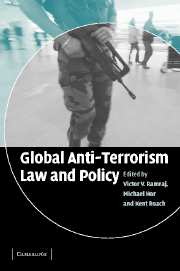Book contents
- Frontmatter
- Contents
- List of contributors
- Acknowledgements
- 1 Introduction
- PART ONE Theoretical Perspectives on Anti-Terrorism Law and Policy
- PART TWO A Comparative Study of Anti-Terrorism Measures
- PART THREE Anti-Terrorism Law and Policy in Asia
- 13 Law and terror: Singapore stories and Malaysian dilemmas
- 14 Indonesia's Anti-Terrorism Law
- 15 The Philippines: the weakest link in the fight against terrorism?
- 16 Japan's response to terrorism post-9/11
- 17 Legal and institutional responses to terrorism in India
- 18 Enacting security laws in Hong Kong
- PART FOUR Regional Cooperation
- PART FIVE Anti-Terrorism Law and Policy in the West
- PART SIX Anti-Terrorism Measures in Africa, the Middle East and Argentina
- Index
18 - Enacting security laws in Hong Kong
Published online by Cambridge University Press: 21 July 2009
- Frontmatter
- Contents
- List of contributors
- Acknowledgements
- 1 Introduction
- PART ONE Theoretical Perspectives on Anti-Terrorism Law and Policy
- PART TWO A Comparative Study of Anti-Terrorism Measures
- PART THREE Anti-Terrorism Law and Policy in Asia
- 13 Law and terror: Singapore stories and Malaysian dilemmas
- 14 Indonesia's Anti-Terrorism Law
- 15 The Philippines: the weakest link in the fight against terrorism?
- 16 Japan's response to terrorism post-9/11
- 17 Legal and institutional responses to terrorism in India
- 18 Enacting security laws in Hong Kong
- PART FOUR Regional Cooperation
- PART FIVE Anti-Terrorism Law and Policy in the West
- PART SIX Anti-Terrorism Measures in Africa, the Middle East and Argentina
- Index
Summary
Introduction
This chapter outlines the events surrounding the resisted and, at times, frustrated attempts to enact security laws in Hong Kong from 2001 to 2004. It will be argued that the resistance was attributable to a number of factors, the most important of which was the absence of a grassroots concept of security, conceived in Hong Kong as a result of a genuine and informed public consultation process. In respect of both the anti-terrorism and national security initiatives, the misguided strategy of the government was to impose a set of proposals at the outset, adopt a defensive attitude in the consultation process, and make significant concessions at the final hour as acts of appeasement. This chapter will conclude with a discussion of ideas for developing a new implementation strategy that will take the discourse on security in Hong Kong to a new level.
Initiatives to enact security laws 2001–2004
Security regime before september 11
While under British rule, seven of the major international treaties on terrorism were extended to Hong Kong after ratification by the United Kingdom. The colonial government in turn implemented these treaties. It was never considered necessary to apply the general anti-terrorism laws enacted in the United Kingdom to Hong Kong.
- Type
- Chapter
- Information
- Global Anti-Terrorism Law and Policy , pp. 368 - 396Publisher: Cambridge University PressPrint publication year: 2005
- 1
- Cited by



